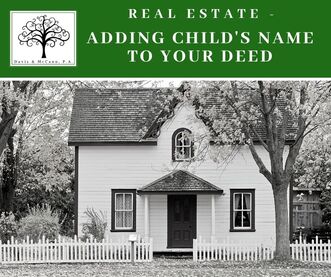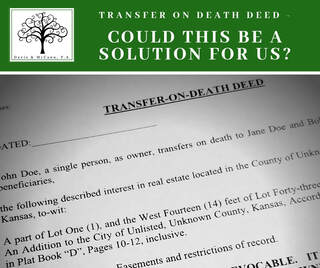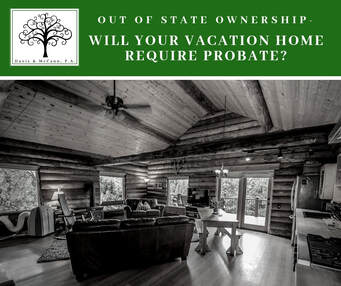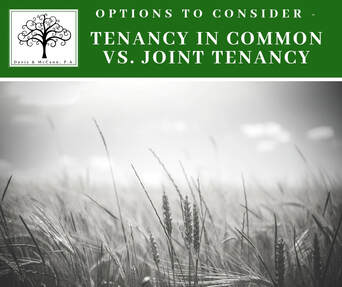 Q: I want to add my child’s name to the title of my home, so they can keep the house out of probate and receive my home quickly after my death. Do you see any concerns with my plan? A: The answer to your question is a solid “maybe”. Your personal circumstances will dictate whether this estate planning strategy is the best move for you. Adding your child’s name to your deed could speed the transfer of your home to your beneficiaries and keep it out of probate. But, before you run off and put your child’s name on the title of your house you should consider a few of these risks. Gift Taxes. By adding your child to the title of your home, you have made a gift that is subject to gift taxes. The gift is likely far below the current federal gift tax exclusion amount, so you shouldn’t have to pay gift taxes. However, you may need to file a gift tax return if the gift is over the annual exclusion amount. Medicaid benefits. If you need KanCare (Medicaid) assistance to pay for nursing home care within 5 years of adding your child’s name to the deed, you could be penalized when requesting benefits. Child’s Death. If your child dies before you, his/her interest in your home becomes part of his/her estate. This interest in your home will be subject to his/her liabilities and would pass to his/her beneficiaries as named in your child’s estate plan. Someone you don’t know or trust could become the new co-owner of your home. Disagreements. If you decide to sell the house and move, your child could legally refuse to transfer ownership back to you. Also, if your child wants to sell your home, that child could force a partition action, a sale of the real estate done through the court. Child’s creditors. If your child is involved in a serious accident, your house could have a lien placed on it to cover his/her debts not covered by insurance. Similarly, if your child is a joint owner, the value of the home could be subject to his/her creditors, should they face bankruptcy or credit issues. Child’s divorce. If your child gets a divorce after being added to your deed, his/her interest in your house may be part of the divorce settlement. Capital gains tax. If you sell the home after adding your child to the deed, your child may encounter unintended capital gains tax problems. No legal obligation. If you add one child’s name to the deed and instruct him/her to share the proceeds from the sale of the home with your other children after your death, they may not be legally obligated to do so. Your other children could be cut out of the inheritance that you intended for them to have. The type of ownership that you give to your child is a very important factor in your considerations. Should you establish a joint tenancy with rights of survivorship (JTWROS), a tenancy in common (TOC), or perhaps you should do a transfer on death deed? Consulting an experienced estate planning attorney prior to adding anyone to your deed will inform you of the pros and cons of each option, as it relates to your personal circumstance. Without adequate counsel, the complications that could arise from such a move may outweigh any possible benefits. For more information on estate planning, probate or real estate matters, contact Davis & McCann, P. A., Dodge City, KS. We are members of Wealth Counsel, a national consortium of Estate Planning Attorneys and Elder Law. We focus our practice on providing clients with the best legal advice on Estate Planning, Probate, Trust Administration, Medicaid and Long-term Care Planning, Family Business/Small Business Succession Planning, Real Estate Transactions, 1031 Exchanges, and related matters.  Real estate encompasses not only one’s primary residence but also other real property such as a vacation home or a rental house. The ideal form of ownership varies depending on the type of real estate you own. Below, we take a look at the different types of real estate and offer advice about the recommended form of ownership for each. Primary Residence Because your primary residence receives special tax treatment, you should carefully consider how your home is owned. In some states, tenancy by the entirety offers married couples creditor protection from the creditors of one of the spouses (with a possible exception for federal tax liens) while still preserving relevant tax benefits. It also allows automatic transfer of ownership to the surviving spouse upon the death of the first spouse without court involvement. Transferring ownership of the primary residence to a joint revocable trust may also be an option if you live in a state that allows the tenancy of the entirety protection to transfer to the joint revocable trust. Ownership by the trust also means that the real estate will not go through a lengthy, expensive, and public probate process but will instead be handled according to your wishes as specified in the trust document. If you are single, owning the property in your name allows you to take advantage of tax benefits for primary residences. Transferring ownership to a revocable living trust may also allow you to retain the applicable tax benefits with the added advantage of avoiding the probate process. If asset protection is a major concern during your lifetime, certain types of irrevocable trusts are best suited for your needs but may require you to give up control of the property.  Are you a first-time owner of farmland in Kansas? Whether you have inherited the farmland or are an investor looking to diversify your assets, you need a plan to manage this new property as a revenue source. As a new land owner, if you have no interest in managing the farmland yourself, you can contact local or regional land management companies to help you with the management process. These companies specialize in locating area farmers to actively farm your land, negotiate lease terms, and essentially act as the landlord in your absence. This is a viable, stress-reduced option for some individuals, especially investors who may not depend on the annual revenue from the farmland. However, you will want to thoroughly understand what the management fees will cover and how much they will impact your profits. If you feel confident in your knowledge of the area where your property is located and are comfortable negotiating directly with farmers, you may want to handle your own lease agreement and landlord responsibilities. As the land owner, if you don’t want to come up with the cash for operating expenses or are unable to do so and prefer instead to just have a guaranteed income annually, it might be desirable to establish a cash lease with your farming tenant. The cash lease is a way to reduce your risk, while guaranteeing you receive a set income. You won’t be responsible for any of the tenant’s expenses related to the crop planting and harvest. The downside is that you will also not be entitled to any of the profits from the crop. A cash lease should be in writing and should include the names of the parties, term of the lease, the property description, the lease rate per acre, payment schedule, renewal terms (if any), and party signatures. We also recommend including a clause regarding workmanship (including noxious weed control), government payment splits (if any), land use, sublet provisions (if any), pasture use (if any) and specifications regarding any easements, minerals, or wind leases pre-existing on the property. There are additional provisions that should be included but may vary based on your individual circumstance, the type of farmland you own and its location. As an absentee land owner with a cash lease, you generally will not be considered to be in the business of farming for tax purposes. Check with your accountant to verify your tax situation prior to negotiating and signing a lease. If you are more comfortable with risk and want the chance to share in a larger profit from the crops grown on the land, you should consider using a crop share lease. A typical Kansas crop share lease holds the landlord responsible for 1/3 of all expenses on the crop and the tenant is responsible for the remaining 2/3 of expenses, however those ratios are negotiable. Expenses may include the cost of fertilizer, lime application, herbicides, etc. The crop yield is split in a similar manner, with the landlord and tenant receiving the same ratios of yield as they contribute to the expenses. The remaining lease provisions will be very similar to the cash lease. Again, additional provisions are necessary to include in a crop share lease agreement that protects you and your tenant, but your unique situation will influence what provisions will need to be included. Although you can receive a larger annual profit by utilizing a crop share lease, you will bear the risk of having a year(s) with complete crop failure and no income (in the absence of crop insurance). If you have questions about a Kansas farm lease, contact Davis & McCann, P.A., Dodge City, Kansas at 620-225-1674. We are members of Wealth Counsel, a national consortium of Estate Planning Attorneys and the National Academy of Elder Law Attorneys (NAELA). We focus our practice on providing clients with the best legal advice on Estate Planning, Medicaid and Long-term Care Planning, Special Needs Planning, Family Business/Small Business Succession Planning, Probate, Trust Administration, Real Estate, 1031 Exchanges, and related matters.  Q: My mother is a relatively healthy 80 year old. A neighbor suggest that we transfer her home to me and have her retain a life estate interest, so she could avoid losing out on benefits from Medicaid, should she need nursing home care in the next few years. I am an only child and my father passed away years ago. What do you think about this idea? A: If the life estate deed is recorded at least five years before your mother requires a full-time nursing home care, this transfer should not bar her from Medicaid qualification. The rules on Medicaid qualifications for this type of situation are complicated to say the least. However, an overly simplified answer would be that her life estate interest will not be counted as a resource for KanCare (Medicaid program in Kansas) qualification purposes. Maintaining your mother’s home while she is in the nursing facility could potentially strain your finances. If she uses a life estate deed, there are other issues you both should consider, including: 1. Sale. If you plan to sell your mother’s home while she is alive, be aware that selling the house will require your and your mother’s consent. Your mother’s life estate interest has a value and such interest likely will then disqualify her from receiving KanCare benefits for a period of time, during which she will have to private pay for her nursing home care. 2. Gifting and Capital Gains Tax. Remember, that even though you don’t have a tangible asset yet due to your Mom’s life estate interest, you have still been gifted the residuary value of the home. Property that is gifted during your mother’s lifetime does not get a step-up in basis at her death, meaning you will likely have to pay capital gains tax on the property if you sell it. The tax you will owe after the sale could be substantial and will depend on factors such as what your mother paid for the property when she purchased it and what you sell the home for. Additionally, this will result in a penalty if your mother goes into a nursing facility and needs to become Medicaid eligible within 5 years of making the gift. 3. Death of Residuary Owner. What happens if your mother gifts you her home, maintains her life estate and then you die before she does? The property would then go to your estate, which may not be what your mother would want. Instead of deeding the house to you and having your mother retain a life estate interest, your mother may want to consider creating an irrevocable trust and deeding the house to the trust. This gives you a lot more flexibility. The trustee could sell the house and the sale proceeds would not disqualify your mother from KanCare benefits. If the house is not sold, then when your mother passes away, the trust could be set up in such a way that you would receive a “stepped-up basis”, resulting in no capital gains taxes if and when you sold the house. Be aware, that this type of trust is very complicated and not something that should be attempted on your own or without expert guidance. Please see an experienced long-term care estate planning attorney to determine the best course of action for your mother’s unique situation. For more information on Real Estate and Medicaid planning, contact Davis & McCann, P. A., Dodge City, KS. We are members of Wealth Counsel, a national consortium of Estate Planning Attorneys and focus our practice on providing clients with the best legal advice on estate planning, Medicaid and Long-term Care Planning, Special Needs Planning, Family Business/Small Business Succession Planning, Probate, Trust Administration, Real Estate, 1031 Exchanges, and related matters.  “An ounce of prevention is worth a pound of cure.” You may be familiar with this famous quote by Benjamin Franklin and think advice from the 1700s would be inapplicable for business decisions in 21st century. However, our experience tells us otherwise. Business owners who try to act as their own attorney when entering into a legally binding document, like a commercial lease agreement, assume a tremendous amount of financial risk. Many intelligent individuals find themselves in the middle of what would have otherwise been a preventable legal or financial mess if they had only sought proper legal advice. Some common items that often trip up business owners when it comes to commercial leases are the exclusion or deficient use of the following clauses: 1. Attorney Fee Clause: If your contract dispute requires litigation, attorney’s fees and court costs should be paid by the person who loses the litigation. Including this clause acts as a deterrent to the filing of frivolous claims. 2. Use of the Property: Avoid surprises by ensuring that the tenant’s intended use of the property is explicitly permitted in the lease. 3. Approval of Alterations and Signage: A commercial lease should require the landlord’s prior written approval prior to the tenant making any substantial alterations to the property. There should also be language requiring that any alterations made be in a workmanlike manner. Finally, the landlord should have to approve in writing to the tenant’s outdoor signage. This is due to the fact that many signage require making permanent alterations to the exterior of the building.  Q: My grandfather has very few assets except his residence in Kansas. He would like his house to go to my mother upon his death. Is there any way the property can transfer to my mother without a probate? A: One of the easiest ways to accomplish this would be for your grandfather to execute a transfer on death deed to your mother. The transfer on death deed will transfer ownership of the property at your grandfather’s death, without probate, to your mother or any other person he names on the deed. How does the transfer on death deed work in Kansas? The property owner (the “Grantor”) executes a specific deed that names a successor beneficiary as the recipient of the property at the Grantor’s death. The deed is then signed before a notary and recorded with the Register of Deeds in the county where the property is located. The Grantor remains the legal owner while living. In addition, he may revoke the deed at any time prior to death by executing and recording a formal revocation or new deed with the county Register of Deeds. At the Grantor’s death, the person named as the beneficiary on the deed becomes the new property owner as soon as the Grantor’s death certificate is filed against the property. Advantages/Disadvantages of transfer on death deed: 1. The property will pass to the named person after Grantor’s death without an expensive and lengthy probate. 2. The Grantor retains ownership and control of the property so long as he/she is living. 3. The property passes to the new owner immediately after the Grantor’s death. No delay occurs in the transfer of ownership; only the recording of the Grantor’s certified death certificate with the county Register of Deeds is required. 4. A transfer on death deed also can be used to transfer mineral interests. 5. A transfer on death deed provides future flexibility and the ability to revoke or change beneficiaries.  It’s finally summer. The kids are out of school and now is the time to visit the family vacation home for some rest and relaxation! If you’re like most people, your vacation home probably is located in a different state than your primary residence. As an owner of a vacation home, do you know how it will pass after your death to your heirs? When someone dies in Kansas, any property owned in their individual name and without a Transfer on Death Deed will require a probate proceeding in order to transfer ownership to their heirs or beneficiaries. However, Kansas probate only applies to Kansas property. Real estate owned outside of the state—like a vacation home or investment property—will require a separate probate in the state where the property is located, known as an ancillary probate. If the vacation home or investment property is put into a Trust during the owner’s lifetime, however, a probate can be avoided and the property can pass to whomever is named in the Trust. Even out of state  Q: Our house is owned by our Revocable Trust. We would like to sell the house. How do we remove the house from the Trust for the sale? A: As the Grantors of your Trust, you can sell property in your Revocable Trust the same way you would sell a property titled in your own names. The only difference is that you use a different type of deed called a Trustees’ Deed. Trustees’ Deeds typically are prepared by your attorney. You should provide a copy of your existing deed on the property to your attorney, showing when the property was deeded to the Trust, and verifying the legal description and recording information. If you are providing title insurance as part of the sale, you will need to purchase a title commitment from your title company. This title commitment will stipulate the information that in required to be included on the deed. Your attorney will use this information to prepare the Trustees’ Deed and Affidavit or a Certification of Trust. An Affidavit/Certification of Trust in Kansas should state the name(s) of the Trustee(s) of the Trust, that the Trustee(s) are legally authorized to sell the property, and that the Trust is in good standing, among other things. The Affidavit may be combined with the Trustees’ Deed, while the Certification of Trust typically is a separate document. The Trustee(s) must sign these documents before a notary public. The documents  Q: What happens when you own property with someone and the co-owner dies? A: The answer depends on how the property is titled. For Kansas residents, here’s the short and sweet version of how property will transfer if a co-owner dies: Tenancy in Common: If the owners are “tenants in common”, the deceased owner’s interest will transfer according to his/her estate plan, or intestacy laws should he/she fail to make a plan. The surviving owner(s) will not obtain the decedent’s interest unless they receive it under his/her estate. The surviving owner will continue to own the same percentage of property, but they may end up sharing the property ownership with a new co-owner(s) after the decedent’s estate is settled. Joint Tenancy: If the property is owned as “joint tenants with rights of survivorship and not as tenants in common” and one of the owners dies, the deceased person's interest transfers to the surviving joint tenant. For the surviving owner to obtain clear title, her/she must file an original death certificate of the decedent with the Register  If you own income-producing property, one of the ever-present concerns you face is the possibility of being sued by a tenant. If you own the income-producing property individually (not in and LLC or corporation), personal assets, such as your home and other investments could be subject to the Court judgment, should you be found guilty in the lawsuit. Additionally, have you considered what will happen when you die? Will your family fight over your home, vacation home, or investments properties? If you haven’t taken the necessary steps to protect your assets from lawsuits or probate, you or your heirs could face a nightmare of legal fees and court dates. Two commonly used tools to protect real estate assets include limited liability companies (LLC) and trusts: LLC: In a nutshell, an LLC protects your personal assets from lawsuits or claims that results from your ownership of assets in the LLC (in this case, real estate). You must comply with Kansas LLC laws in order to receive those protections, but with the assistance of an experienced attorney, this is easily accomplished. Your attorney should prepare the LLC formation documents, file your LLC with the State and advise you on your compliance duties with the State. Formation documents should at least include: Limited Liability Articles of Organization and an Operating Agreement detailing who the members are and what their |
NEWS YOU CAN USEDavis & McCann, P. A., Archives
April 2021
Categories
All
|

 RSS Feed
RSS Feed